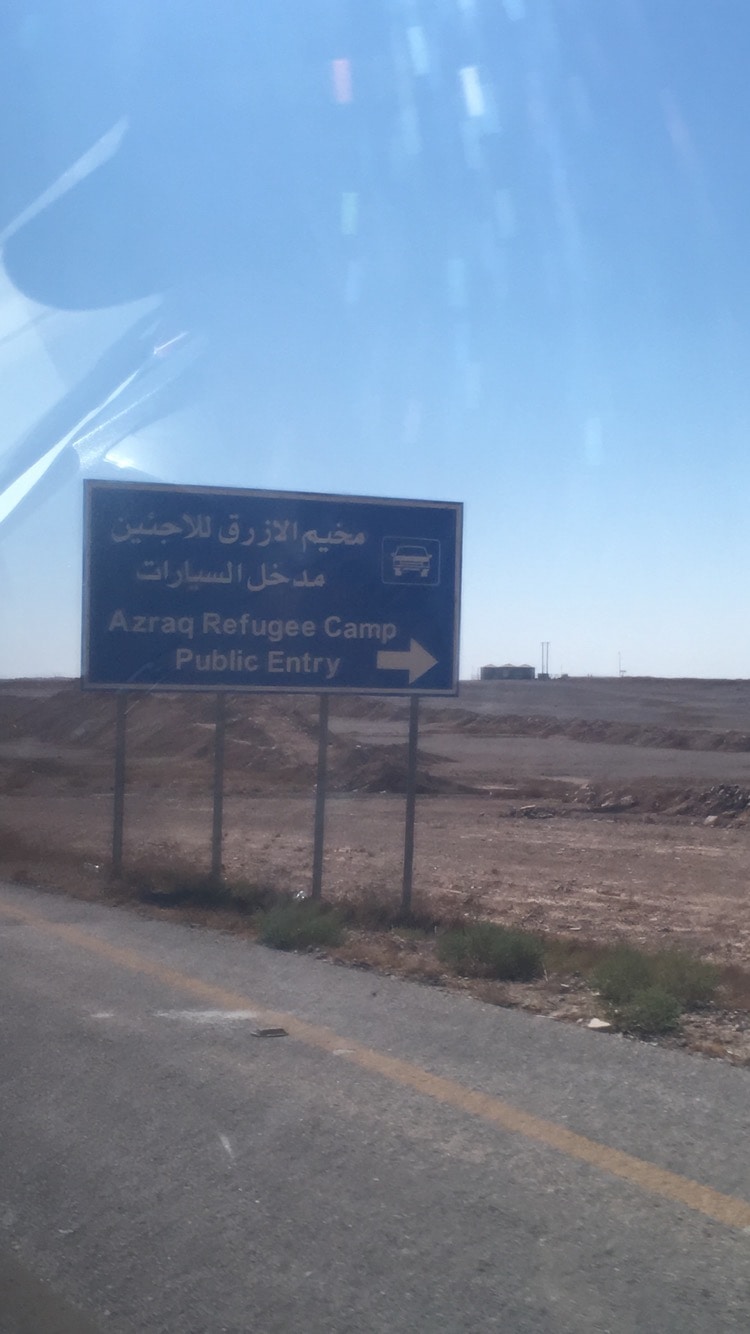Day 10
In less than 24 hours, I’ll be on my way east of Amman to the Azraq Refugee Camp.
Surreal is the only way I can describe how I’m feeling, because this opportunity and experience is unlike anything I’ll probably ever experience again.
Jordan has brought in nearly a million and a half Syrians since the conflict began, and the number continues to rise.
The country itself, is home to roughly six million people, so as you can imagine, it’s struggling to find a place to house everyone.
So they decided to build the Azraq Refugee Camp. It’s the newest refugee camp, constructed in the remote Jordanian desert and opened in April 2014.
It’s a city built from scratch, in the middle of a desert that stretches as far and wide as the eye can see.
The planned community is unlike any other refugee camp, because this one was built very strategically and carefully. The others are usually built hastily, in response to a disaster.
The rows upon rows of white steel shelters are sectioned off into small villages, where in total, about 36,000 Syrians presently live, according to a recent United Nations High Commissioner for Refugee (UNHCR) report.
They come from places like Damascus and Homs, where turning back isn’t an option.
I hope to be able to speak with a few families living at the camp and see what life is like inside Azraq.
What is the access to education like?
How do families spend their days?
What’s a day in the life of a Syrian refugee family, living in the middle of the barren desert?
Tomorrow, I hope to find out.
Kaleigh
Day 11
For some reason, I couldn’t really sleep last night. I must have had a big day ahead of me, or something!
We set off for Azraq bright and early, driving through eastern Amman, a visibly poorer part of the city. Teenagers played soccer on the asphalt in a giant parking lot, unbothered by the sweltering heat, even at eight in the morning.
The cramped houses and apartment buildings started getting fewer and farther between, and I had just started to doze off, when we were waved over by police on the side of the highway.
Great, another checkpoint, I thought.
It turns out; our yellow and green cab drew attention because we were passing in an area usually frequented by yellow and blue cabs.
A quick conversation with the officer and we were on our way.
It wasn’t an unsettling experience, and it also wasn’t the only trouble we’d have with our cab. More on that later!
The bumpy highway continued for an hour and a half outside of Amman, and as we inched closer and closer to the camp, nervousness washed over me.
Perhaps it was the lack of blue skies and instead, an eerily white haze of heat over the desert.
Regardless, it was an overwhelming feeling being so close to such an adventure.
We went to about three different entrances to the camp, only to be turned away and sent to another one.
Finally, we reached an entrance and it looked like we were making progress. That is, until we were officially told we wouldn’t be allowed inside today…at all.
Apparently we weren’t allowed to enter the camp because we were driving in a taxi, and not a private car. We decided to take a chance and head to Azraq City to get a rental car, but were told over the phone that that wouldn’t be allowed either.
By the time all of this was sorted out, it was nearing noon, and our written permission to the camp was only good until three.
Now, even though we had this written permission from the Media Commission in Amman, and were never warned about any specific car being an issue, we were turned away.
We trudged along the dusty highway back towards Amman to speak with the very commission that gave us our papers in the first place.
The director of foreign media sits in an office on the third floor, near the “new downtown” in Amman. Cigarette lit and smoking from the ashtray on his desk, we were waved in to sit down on the leather chairs just in front of him.
A few important-looking men walked in and out of his office, one dressed in a UNICEF uniform, all speaking Arabic to one another.
Needless to say, I didn’t really have a clue what was going on.
Eventually, they explained that there seems to be a disconnect between the Media Commission and the actual camp, and it’s been a logistical headache for a while now.
He gave the example of last Friday, in the middle of Eid, when several journalists were turned away because the camp was “closed.”
Bureaucracy at its finest.
The commissioner suggested we visit another umbrella commission, which handles all Syrian refugee camps in Jordan.
After several glances at our permission papers, passports, press cards and more, we finally received another form that will register Mohammed’s car to drive us to the camp tomorrow.
I sat in the dimly lit office, with shiny white floors, and the smell of cigarette smoke wafting through the room, waiting for Mohammed to finalize everything.
One officer came up to me and started speaking French. I thought I was being pranked, but Mohammed had mentioned to him that I’m from Canada and am bilingual.
We spoke briefly about my work in Jordan, why I know French, his background with the language, and his happiness to have a conversation in “la langue des oiseaux,” or the language of the birds.
I later had to look that up. In simple terms, it means an angelic and mystical language – he’s clearly a fan of français.
Tomorrow will hopefully be a more successful day of storytelling – preferably that of the refugees living at Azraq, and not my own.
Here’s hoping!
Kaleigh



